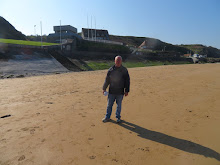I read a little in 2018. I wish I had read more, but my vision was occluded by my retina degeneration and I spent many weeks in recovery. Reading books for information, knowledge or pleasure is a lifelong multifaceted enterprise--history, philosophy, biography, literature, fiction, the sciences, great books, poli-sci, but I think many modern Americans will default to a one minute search of wikipedia, and done. Knowledge stored and confirmed.
Here's the baker's dozen list of books I read in 2018, in order of how significant I thought they were to me. Past is prologue, and knowledge is power.
To the Lighthouse by Virginia Woolf. This book took me a year to read and I read it in response to a course I took on Victorian female authors, whom I had never read as a boy growing up in the 1960s. The book was very dense and went on very long but it had its interesting moments, and now I can read a novel by Jane Austen and be done with this enlightening quest.
Legs by William Kennedy. Crime in the 1930s brought to us (along with the Mafia and scoffing at laws) by the Prohibition Amendment. Molding our country's more's through constitutional amendments, and this novel describes the unintended aftermaths.
1493 by C Charles C. Mann. The Columbian Exchange, which was mostly one-way, foodstuffs towards Europe, diseases to the Americas. This book was very interesting but it went on too long, getting into very obscure subjects.
Codename Downfall by Thomas Allen and Norman Polmar. The American plan to invade Japan in 1945 and 1946. It would have been very bloody, involving millions of casualties and probably would have seen the tactical use of nuclear and chemical weapons on the battlefield and resulted in a Japan divided into a communist north and a democratic south, just like in Korea.
Why Germany Nearly Won by Steve Merctante. Germany (the Nazis) acted very badly and lost World War II. The Americans, British and Canadians stormed Fortress Europa on D-Day in 1944 and won the war in ten months but meanwhile the Soviet forces were tying up two thirds of the Wehrmacht's forces. Not that I feel sorry or grateful for the Russians, they participated with the Nazis in dismembering Poland in 1939 which was the naked invasion that started World War II. The Russians did most of the fighting against the Nazis for four years but they got what they wrought.
Isaac's Storm by Erik Larson. The greatest natural disaster in US history, a hurricane that devastated Galveston and killed 15,000 Americans.
The Storm of the Century by Al Roker. Yep, 15,000 Americans drowned in Texas in 1900. A story of meteorology, racism and fake news.
Operation Sea Lion by Leo McKinstry. Would the English have thrown the Nazis back into the sea in 1940, and thereby saved the world we now know? America barely helped, but thank the lord that the British developed radar and produced the Spitfire fighter and barely saved history.
The Origins of the Second World War in the Pacific by Akira Irtiye. The war actually started in 1931 when the Japanese threatened then invaded China. Japan couldn't actually subjugate all of China to end the fighting and had its own Vietnam there.
Asiatic Land Battles by Trevor Dupuy. Yep, we beat the Japanese, with some Australian and British assistance. Ours was more of a naval and aerial war, but there was ground fighting in Burma and on the islands, large and small, in the Pacific.
World War Two, The Battle of the Bulge Re-Assessed by Charles Whiting. No matter how you look at it, the Allies won. The Nazis threw their last reserves against American forces in the Ardennes in December 1944 in the greatest battle in U.S. history, and thereby greatly aided the Soviet takeover of Eastern Europe.
The Profiler by Pat Brown. My guilty pleasure, crime scenes deciphered (I was a policeman for nine years before I went to law school).
Dragon Teeth by Michael Crichton. Another "found" manuscript by a science fiction author who died more than a decade ago.
Friday, December 28, 2018
Subscribe to:
Post Comments (Atom)

No comments:
Post a Comment